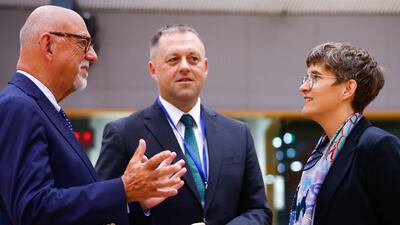Several European Union governments called today for switching from unanimity votes to majority voting in some cases to accelerate decision making.
Consensus is a major part of the EU’s decision-making process but recent discussions to remove veto powers are linked to divisions over how to respond to Russia’s invasion of Ukraine in February.
Germany’s Minister of State for Europe Anna Lührmann told reporters on Tuesday that “there should be fewer veto rights" as she headed to a meeting of European affairs ministers in Brussels.
Some countries expressed cautious support for the idea, with Austria’s Minister for the EU Karoline Edtstadler saying that unanimity should remain for sanctions and accession of new members.
Why are vetoes such a hot topic?
Though ministers refrained from finger-pointing, Hungary's pro-Kremlin stance is widely viewed as the main reason some countries want to side-step its veto powers.
Hungarian media recently reported that Budapest is expected to block European talks on extending sanctions on Russia in the autumn.
Lithuanian Foreign Minister Gabrielius Landsbergis earlier this year accused Hungary of “holding the EU hostage”.
Hungary’s relationship with the EU has been tense for years. The European Commission on Sunday recommended suspending the equivalent of €7.5 billion funding over democratic backsliding.
But changing the way the EU votes is far from straightforward.

Countries that support limiting veto powers have indicated that one way to do it would be to use the EU’s so-called passerelle clauses.
What is a passerelle clause?
The main objective of passerelle clauses is to make decision-making more flexible.
It removes the need for member states to find unanimity in the European Council by agreeing to use qualified majority voting, according to a 2020 report published by the European Parliamentary Research Service.
“The most remarkable legal as well as political effect derived from the adoption of a general passerelle clause is the loss of veto power for individual member states,” states the report.
Passerelle clauses have never been used since their introduction to the 2007 Treaty of Lisbon.
One reason for this may be because implementing passerelle clauses is complicated and requires unanimity in the European Council.
In other words, it is necessary for the council to unanimously agree to remove the need to find unanimity in the future. Abstention does not count as a vote against the initiative.
The EU Parliament must also be consulted.
The adoption of general passerelle clauses are of a “highly political nature", says the parliament’s report.
Do member states lose power?
Not really.
Shifting to a qualified majority vote means that a decision must be supported by 55 per cent of Council members, or at least 15 states.
A “blocking minority” must comprise at least four council members, said the 2020 European Parliament report.
What can passerelle clauses be applied to?
The procedure can be applied to a broad range of matters, including the internal market, freedom, security and justice, but not to military matters, the 2020 report says.
According to a European Council document obtained by news website Politico on Tuesday, “several delegations are … willing to consider using the passerelle clauses in particular … for sanctions, human rights, or CSDP [Common Security and Defence Policy]".


